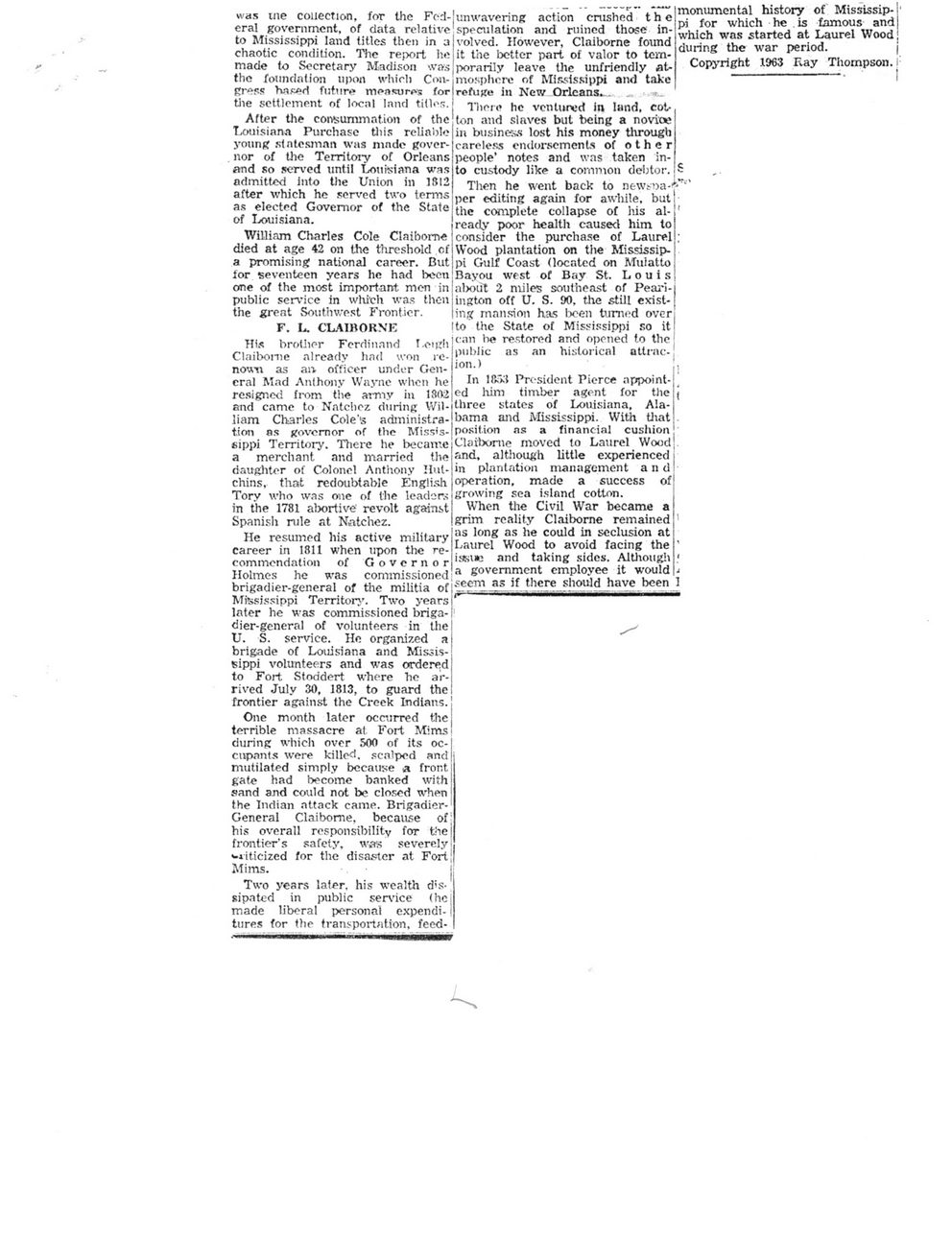This text was obtained via automated optical character recognition.
It has not been edited and may therefore contain several errors.
was we collection, for the Federal government, of data relative to Mississippi land titles then in a chaotic condition. The report he made to Secretary Madison was tho foundation upon which Congress hased future measures for the settlement of local Innd titles. After the consummation of the Louisiana Purchase this reliable young statesman was nuute governor of the Territory of Orleans ?nd so served until Louisiana was admitted into the Union in IS 12 after which he served two terms as elected Governor of the State of Louisiana. j William Charles Cole Clniborne died at age 42 on the threshold cf a promising national career. But for seventeen years he had been one of the most important men in public service in which was then the great Southwest Frontier. F. L. CLAIHORNK unwavering action crushed the speculation and ruined those involved. However, Claiborne found it the better part of valor to temporarily leave the unfriendly atmosphere of Mississippi and take refuge in New Orleans. _ There he ventured in lund, cotton and slaves but being a novice in business lost his money through careless endorsements of other people? notes and was taken into custody like a common debtor. I Then he went back to ntWt?ja-^'? per editing again for awliile, but the complete collapse of his already poor health caused him to consider the purchase of Laurel Wood plantation on the Mississippi Gulf Coast (located on Mulatto Bayou west of Bay St. Louis about 2 miles southeast of Peari-ington off U. S. 90, the still existing mansion has been turned over (to the State of Mississippi so it monumental history of Mississip-I' pi for which he is famous and| which was started at Laurel Woodj during the war period. I Copyright 1963 Eay Thompson. !' His brother Ferdinand T.oigh Claiborne already had won renown as art officer under General Mad Anthony Wayne when he resigned from the army in 1802 and came to Natchez during William Charles Cole's administration as governor of the Mississippi Territory. There he became a merchant and married the daughter of Colonel Anthony Hutchins, that redoubtable English Tory who was one of the leaders in the 1781 abortive revolt against Spanish rule at Natchez. He resumed his active military career in 1811 when upon the recommendation of Governor Holmes he was commissioned \ brigadier-general of the militia of Mississippi Terri ton?. Two years later he was commissioned briga-1 dier-general of volunteers in the! U. S. service. He organized ai brigade of Louisiana and Missis-! sippi volunteers and was ordered! to Fort Stoddert where he ar-| rived July 30, 1813, to guard the! frontier against the Creek Indians.! One month later occurred the! terrible massacre at Fort Mims during which over 500 of its occupants were killed, scalped and mutilated simply because a front gate had become banked with sand and could not be closed when the Indian attack came. Brigadier-1 General Claiborne, because of; his overall responsibility for thej frontier's safety, was severely; witieized for the disaster at Fort Mims. i can lie restored and opened to the public as an historical attrac-ion.) In 1R>! President Pierce appointed him timber agent for the three states of Louisiana, Alabama and Mississippi. With that position as a financial cushion Claiborne moved to Laurel Wood and, although little experienced in plantation management and operation, made a success of growing sea island cotton. When the Civil War became a grim reality Claiborne remained as long as he could in seclusion at Laurel Wood to avoid facing the insane and taking sides. Although a government employee it would seem as if there should have been 1 Two years later, his wealth dissipated in public service (he made liberal personal expenditures for the transportation, feed-

Claiborne, J.F.H Claiborne-J.F.H-101